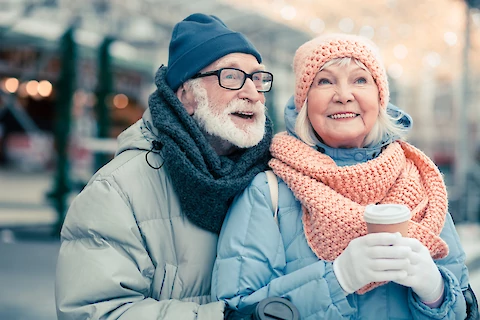
We're all affected differently by the cold fall and winter months. For many of our elderly loved ones, these periods can be challenging times – either due to seasonal illness or having their time outdoors limited by severe weather and reduced daylight. Thankfully, Charleston, South Carolina, rarely sees freezing or really cold temperatures like other parts of the country. These shorter encumbering days may result in low moods, a tell-tale sign of a form of depression called Seasonal Affective Disorder (SAD). Fortunately, there are ways for caregivers to help senior citizens improve their quality of life during fall and winter on frigid days.
The Winter Blues: An Overview
What we casually call "the winter blues" or SAD is a period of melancholy ushered in by the chill of winter and fall and the increasing earlier sunsets. Scientists believe less sun exposure during winter causes brain chemistry changes, like variations in melatonin and serotonin levels. Symptoms of depression can begin to manifest due to these biochemical shifts.
Symptoms of seasonal depression include:
- Low energy
- Fatigue
- A general feeling of sadness
- Low motivation
- Appetite changes
- Sleeping problems
In addition to the biological factors, various holiday obligations and expectations also carry their own stresses. Caregivers should be exceptionally watchful of their elderly loved ones during winter and keen to ensure their bodies and minds are actively engaged.
Tips for Maintaining Senior Activeness for Better Quality of Life in Fall and Winter
According to the CDC, around 15-20% of adults above the age of 65 experience depression. The colder, shorter winter and autumn days can worsen or intensify these symptoms. As caregivers continually engage their senior clients physically and socially, they can see their own spirits and quality of life improve.
The following suggestions will help:
1. Maintaining Physical Activity Improves Quality of Life in Fall and Winter
The wet and slippery sidewalks make walking or working outside during winter difficult. Caregivers work around these situations by conducting smaller workouts at home during these months. Even if the exercise intensity is slightly reduced, these in-house routines help keep them moving, reduce fall risk, and build strength. Additionally, exercise fatigue leads to improved sleep duration and quality.
There are lots of workouts seniors can do at home. Using simple home equipment like dumbbells and balance discs, doing a couple of lunges and squats, or following along with guided yoga sessions on YouTube will get the blood flowing. It's always advisable to consult with a physician before starting any exercise program.
2. Increasing Exposure to Light
Increasing a senior citizen's natural light exposure does wonders for their sense of well-being during fall and winter. This can be done by:
- Go out in the sun! A 10-minute walk or even just sitting in the backyard or on the porch is beneficial.
- Let more light into the home by opening window covers.
- When inside, socialize and spend the majority of time with the senior in the brightest room(s).
If the weather gets rough or your client has mobility challenges, light therapy is an effective way of experiencing light exposure without having to go outside. They'll need to sit in front of a light therapy lamp for certain lengths of time per day. It's imperative to consult with a doctor before using this artificial light, as the wrong amount or intensity of the light may cause issues.
3. Further Assistance to Improve Quality of Life in Fall and Winter
If symptoms of seasonal depression in a client worsen, then a visit with the doctor is in order. Not only will they help diagnose the symptoms better, but they may also recommend lifestyle changes and suggest appropriate medications or counseling reduce stress and improve the client's quality of life.
4. Engage in Interpersonal Interactions
Senior citizens may feel some level of loneliness even during sunny days. Keeping themselves mentally and emotionally stimulated through visiting local senior centers or activity centers helps fill that void.
A caregiver may help the senior loved one remain engaged with the community around them through video chat apps like FaceTime and Skype.
Senior Helpers Charleston Provides Professional Care
We can't stress enough the importance of listening to the senior citizen's input in hiring a caregiver. It emphasizes their autonomy in their own life, reduces anxiety or future frustration on their part, and helps them accept the caregiver gracefully as part of their everyday life.
If you are considering getting your loved one a caregiver, Senior Helpers Charleston offers an array of compassionate and customized in-home senior care services throughout Charleston, Mt. Pleasant, North Charleston, Hanahan, Awendaw, Isle of Palms, Sullivan's Island, Goose Creek, and Huger. Contact us anytime, and let's provide you and your loved one peace of mind.